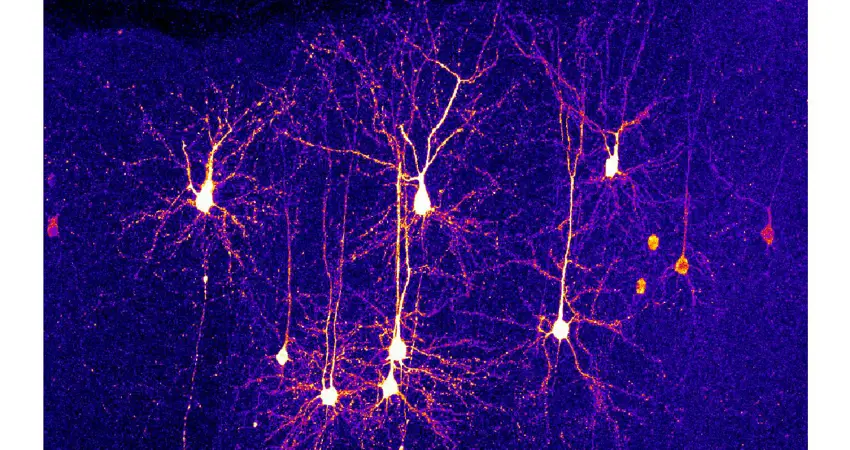17 Feb 2022
UKRI and Wellcome award £2.4m for multidisciplinary research probing the neocortex
Professor Martin Booth co-leads award winning project on microscopic methods for analysing important regions of the brain

Sparse GCaMP6f labelling of pyramidal cells in motor cortex. Credit: the SilverLab at UCL
Today, UK Research and Innovation (UKRI) and Wellcome announce a £18 million investment for nine multidisciplinary research projects through the Physics of Life Strategic Priorities Fund. Physics of Life a unique approach harnessing physics approaches to tackle grand challenges in the life sciences. The research involved transforms our understanding of life by bringing together innovative approaches in life sciences and physics.
“This project will be a great opportunity for us to … facilitate better understanding of brain function”
The projects announced today include one led by Professor Martin Booth from the University of Oxford’s Department of Engineering Science, and Professor Angus Silver of University College London. They have been awarded £2.4million to fund their project Optimising light-tissue interaction to enable multiscale imaging of neuronal dynamics deep within the neocortex. The project focuses on new methods for understanding the neocortex region in our brains and to answer questions like ‘How do our brains process information and enable us to learn complex tasks?’
“The neocortex is the part of the brain that plays a central role in allowing us to learn new motor skills, such as typing, driving a car or playing tennis. Despite its importance in the process of learning, attempts to find out exactly how it helps us to improve task performance during learning is hampered by an inability to image activity within the neocortex” Professor Booth explains.
”Probing deep into the brain will require new microscopic methods and improved understanding of how light propagates through tissue. The project will bring together physicists, microscope developers and neuroscientists to develop new ways to see deeper and reveal how this important area of our brain functions ”
Booth adds, "This project will be a great opportunity for us to develop advanced microscope technology for observing neural activity and to facilitate better understanding of brain function. We will bring together Physics, Engineering and Neuroscience expertise from Oxford and University College London in a truly interdisciplinary research programme to achieve goals that could not have been met through separate projects.”
“[T]he Physics of Life programme is funding exciting new approaches with potentially major societal benefits”
Science Minister George Freeman says, “One of the unique strengths of the UK science ecosystem, and our new research agency UKRI is the ability to bring different sciences together - to unlock new discoveries and solve the big challenges of our day”
“From new carbon capturing algae to mapping brain functions, the Physics of Life programme is funding exciting new approaches with potentially major societal benefits.”
The Physics of Life programme is delivered through UKRI’s Strategic Priorities Fund by the Engineering and Physical Sciences Research Council (EPSRC), Biotechnology and Biological Sciences Research Council (BBSRC) and Medical Research Council (MRC).
This second phase is further enhanced by support from Wellcome.
EPSRC Executive Chair Professor Dame Lynn Gladden says, “Physics of Life builds on a decade-long focus with the research community to bring together physics and the life sciences to improve our understanding of living systems”
“Through a wide range of innovative approaches, these projects will generate important new knowledge that will help us to answer some of science’s biggest problems, ranging from how life formed through to tackling climate change.”
Michael Dunn, Director of Discovery Research at Wellcome, comments, “It is important to recognise that progress in the life sciences has at times been greatly accelerated by collaborating with other scientific fields”
“With interdisciplinary teams of physicists, engineers and biologists, the Physics of Life projects will draw on cross-cutting expertise, helping to deliver exciting new insights with the potential to improve life, health and wellbeing.”
About the funding providers
UK Research and Innovation (UKRI) is the largest public funder of research and innovation in the UK, with a budget of around £8bn. It is composed of seven disciplinary research councils, including BBSRC, EPSRC and MRC, Innovate UK and Research England.
Wellcome supports science to solve the urgent health challenges facing everyone. We support discovery research into life, health and wellbeing, and we’re taking on three worldwide health challenges: mental health, global heating and infectious diseases.
The Engineering and Physical Sciences Research Council (EPSRC) is the main funding body for engineering and physical sciences research in the UK.




